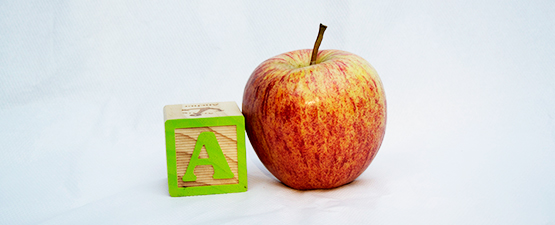In a recent Washington Post article, author Caroline Taggar provides insight on the origin of the phrase “an apple a day keeps the doctor away.” She states that the first recorded use of the adage was in the 1860s. Interestingly enough, the original wording was, “Eat an apple on going to bed, and you’ll keep the doctor from earning his bread.” Taggar goes on to explain, “One of the odd things about this proverb is that it means exactly what it says. Apples are good for you.”
Indeed. Apples are an easy stepping-stone on your journey to incorporate more whole foods into your diet. Ayurvedic medicine has been leveraging their health benefits for thousands of years. And conventional medicine continues to explore these benefits:
- The American Heart Association reported on a Dutch study that found a 52 percent lower risk of stroke incidence for people with a high intake of fruits with white flesh (apples and pears).
- A Florida State University study found that eating apples daily appeared to lower levels of cholesterol and two other markers associated with plaque and inflammation in artery walls.
- A UC Davis study found that apple extract was able to protect cells from damage and death by interfering with communication between cells.
With these findings in mind, it’s no surprise that apples remain a popular commodity in the produce department. Display islands of large, shiny, inexpensive, flawless apples greet you at the store entrance. The aesthetic, alone, is enough to prompt a purchase. But what is the real cost of this visual perfection?
As a research and advocacy organization, the Environmental Working Group (EWG) publishes an annual guide that ranks pesticide contamination on 48 popular fruits and vegetables based on an analysis of more than 28,000 samples taken by the USDA and FDA.
In its 2013 Guide to Pesticides in Produce**, EWG places apples at the top of its “Dirty Dozen” list of foods most often contaminated with pesticides. Of the apples sampled, 99 percent tested positive for pesticide residue. And as shocking as this percentage is, it is even more unsettling to know that all of the apples were washed prior to testing.
The idea that an apple is not just an apple anymore embodies what is happening throughout our food system. It is mired in controversy over the amount of chemicals, pesticides and toxins used to grow and deliver fresh-looking, low-cost foods to market. And even organic foods face similar challenges in this debate. For example, USDA organic regulations currently allow streptomycin and tetracycline antibiotics spraying in organic orchards.
One thing is certain—our food system challenges are complex. Farmers need to maximize production and reduce crop loss to infestations and blights. Safety standards need to be reliable. Stores need to sell what they buy. The list goes on. But as a consumer, you have the power to bring about gradual change. As your priorities and food dollars shift to healthier options, the food system will begin to shift, too.
Does this mean you should stop eating apples? Absolutely not! We just posted about the joy of eating apples for breakfast. Here are a few tips to keep in mind:
- Buy fruit that has been raised in line with an organic standard. It might not be perfect, but it does reduce your chemical exposure. (Keep in mind that organic certification can be expensive to obtain. Many smaller farmers adhere to these standards, but cannot justify the investment in the certificate.)
- Support a local farmer by purchasing from an area orchard. The fall season is apple season!
- Always ask questions. Don’t assume that any apple (local or otherwise) has been raised without harsh chemicals.
- Understand that it is virtually impossible to raise apples in certain parts of the country without spraying for pests, mites and fungi. Ask about the frequency of these treatments. Low spray and/or integrated pest management (IPM) practices generally still use synthetic pesticides, but they are used “as needed” instead of on a set weekly or bi-weekly basis.
- Always core and peel your apples. The skins certainly have nutritional value, but as the EWG’s testing shows, washing does not eliminate exposure.
At Ayureka, our goal is to encourage you to bring consciousness to your daily diet and lifestyle decisions. Making the right choice is not always easy. The more you understand about the realities of our current food system, the more empowered you are to take charge of your own wellbeing.
What are your thoughts on your fruit and produce buying habits? Do you find it hard to pass up “bright and shiny” in favor of organic?
**The Dirty Dozen is a creative way of suggesting if you only buy a limited number of organic produce, these 12 items should hit your list first. They enable the biggest return on your dollar.


